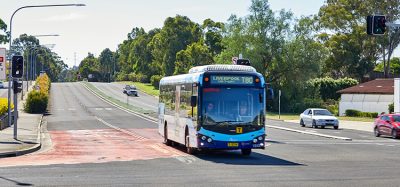Keolis trials 5G-connected, remotely monitored autonomous electric minibus
- Like
- Digg
- Del
- Tumblr
- VKontakte
- Buffer
- Love This
- Odnoklassniki
- Meneame
- Blogger
- Amazon
- Yahoo Mail
- Gmail
- AOL
- Newsvine
- HackerNews
- Evernote
- MySpace
- Mail.ru
- Viadeo
- Line
- Comments
- Yummly
- SMS
- Viber
- Telegram
- Subscribe
- Skype
- Facebook Messenger
- Kakao
- LiveJournal
- Yammer
- Edgar
- Fintel
- Mix
- Instapaper
- Copy Link
Posted: 29 October 2021 | Intelligent Transport | No comments yet
In addition to being 5G-connected, remotely monitored and autonomous, Keolis’s new electric minibus features an internal AI system that detects passengers’ wellbeing and behaviour.
On 28 October 2021, Keolis and its partners – Ericsson, Telia, Urban ICT Arena, Intel and T-engineering – tested a 5G-connected, remotely monitored autonomous electric minibus at Kista Science Centre in Stockholm. The bus is supported by an internal artificial intelligence (AI) system that detects passengers’ wellbeing and behaviour.
This demonstration explores how real-time data from inside the autonomous vehicle can be transmitted to the centralised supervision (traffic) tower and how, in return, the vehicle responds to its commands with the support of an AI system and extremely high 5G network data speeds. The data, collected by cameras, includes counting passengers and tracking items left behind on the bus. These lost items are signalled to passengers using outboard microphones. The system also detects ‘abnormal’ passenger behaviour and informs the supervision tower if someone is not feeling well. The operator in the supervision tower can then take immediate action by calling a doctor or an ambulance.
The incorporation of artificial intelligence is an important step in preparing for full autonomy and in removing the driver safely from the bus. Keolis and its Swedish partners plan to start running trials without a safety driver on board at the end of 2022/ early 2023.
5G connectivity is provided by Telia in collaboration with Ericsson. Intel is delivering processing power to both the IT system in the vehicles and the supervision tower, as well as the mobile network. The vehicle, equipped with self-driving technology, is provided by the Swedish technology firm T-engineering.
Bernard Tabary, CEO International at Keolis, said: “Enhancing everyday lives by making shared mobility smarter and more sustainable is essential for the future of public transport. As we move towards fully autonomous driving, our demonstration in Stockholm represents an important new step by integrating AI detection sensors to create a safe, comfortable passenger experience. We are extremely pleased with this new development in autonomous driving with our partners in Sweden, following successful trials over the past year.”
This demonstration follows the one in Royal Djurgården, Stockholm, in 2020, when Keolis teamed up with the same partners to demonstrate remote control and supervision of autonomous electric vehicles using 5G technology.
From mid-January to the end of May 2021, Keolis also tested a Navya-built autonomous electric shuttle service in Gothenburg’s Lindholmen Industrial and Science park. In 2019, Keolis partnered with Volvo to demonstrate a 12-metre-long electric bus, which was able to park, wash and recharge autonomously at the Keolis depot in Gothenburg.
A pioneer in autonomous driving, Keolis trialled the world’s first autonomous vehicle in Lyon, France in 2016. Since then, Keolis has operated autonomous vehicles in Australia, Belgium, Denmark, Canada, Sweden, the U.S. and the UK, carrying 210,000 passengers and covering over 140,000 km. In parallel, Keolis is testing fully autonomous vehicles at its own test site closed to traffic in Châteauroux, France.
Related topics
5G & Transport Communications, Alternative Power, Artificial Intelligence, Connected & Autonomous Vehicles, Intelligent Transport Systems (ITS), Passenger Experience, Sustainable Urban Transport, Vehicle & Passenger Safety
Related organisations
Ericsson, Intel, Keolis, Kista Science Centre, Navya, T-engineering, Telia, Urban ICT Arena, Volvo Buses
Related people
Bernard Tabary







